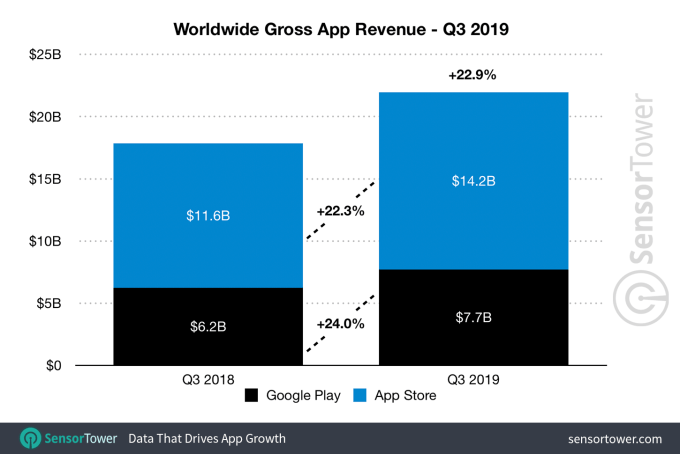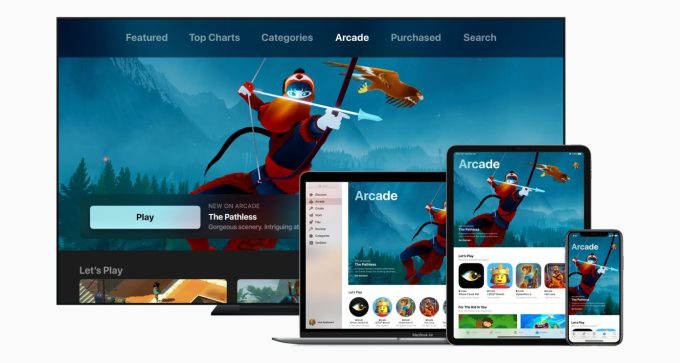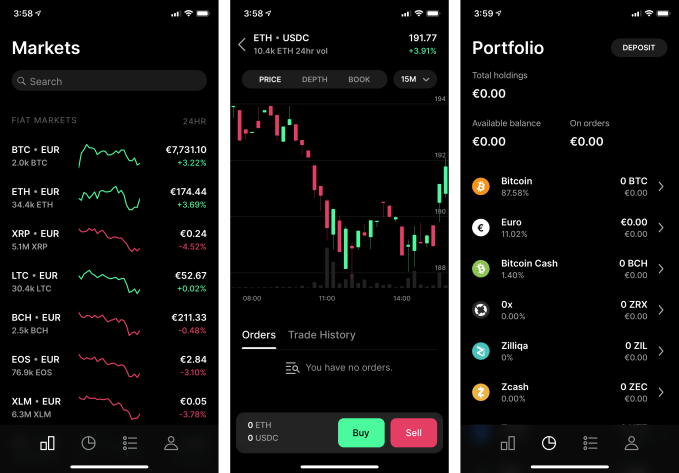Welcome back to This Week in Apps, the Extra Crunch series that recaps the latest OS news, the applications they support, and the money that flows through it all.
The app industry in 2018 saw 194 billion downloads and more than $100 billion in purchases. Just in the past quarter, consumer spending exceeded $23 billion and installs topped 31 billion. It’s a fact: we spend more time on our phones than we do watching TV.
This week, the only thing on everyone’s minds was App Store censorship and Apple’s capitulation to the Chinese government. We also looked at the launch of a high-profile Catalyst app’s launch, and delved into a new analysis of Q3 trends.
Apple caves to China’s demands on App Store censorship
App Store censorship is a hot topic again this week, as Apple made the disappointing decision to cave to demands from Chinese officials to pull the HKmap app, which was being used by pro-democracy protestors in Hong Kong to crowdsource information about police presence and street closures. Apple originally banned the app, then changed its mind and allowed it back in the App Store, which prompted criticism by the Chinese government — which led Apple to pull the app down again.
Apple CEO Tim Cook defended the company’s stance in an employee memo, where he said that Apple received “credible information” that HKmap wasn’t just being used to spot police activity, but to “maliciously to target individual officers for violence and to victimize individuals and property where no police are present.” Apple didn’t share any details as to when or where such activity took place.
This is a bigger deal than just one app; over the years, Apple has consistently appeased China’s government in a variety of ways, whether that’s pulling VPN apps, removing the Taiwan flag emoji from iOS keyboards, or now even pulling the app version of Quartz from the Hong Kong App Store because of its news coverage.
TikTok scrutinized for possibly censoring content at China’s demands
Beijing-headquartered video app TikTok was also in the news for censorship allegations this week. Senator Marco Rubio (R-FL) tweeted that there’s “ample and growing evidence that TikTok’s platform for Western markets, including the U.S., are censoring content in line with China’s communist government directives.”
As we previously reported, TikTok had come under fire for banning pro-LGBT content and other topics, like Tiananmen Square, Tibet, and the Hong Kong protests.
Rubio said he wanted the federal investigative group, the Committee on Foreign Investment in the U.S., to review TikTok’s acquisition of U.S. app Musical.ly, which was acquired by China’s ByteDance for $1 billion in 2017. The company then merged the two apps’ user bases to create a giant app that’s currently one of the most downloaded in the world. TikTok went on record to deny it was censored by China, saying that it’s U.S. localized and adheres to U.S. laws.
Chinese censorship issues aren’t limited to the App Store ecosystem; this week in gaming, Blizzard banned pro Hearthstone player Ng Wai “blitzchung” Chung for speaking in support of Hong Kong protestors. The NBA was impacted, too, when Houston Rockets GM Daryl Morey tweeted in support of the Hong Kong protests, which he later pulled down and apologized for. Google Play also removed an app that let Android users roleplay as Hong Kong protestors, saying it violated rules related to “sensitive events.” (Also, it was just in bad taste.)
Twitter goes the Mac Catalyst route
Twitter returned to the Mac this week in the debut of a new Catalyst-powered app for macOS Catalina, launched on Thursday. The company in June had been among the first to announce its plans to take advantage of Mac Catalyst, Apple’s new toolset for bringing iPad apps to the Mac desktop, following Apple’s Worldwide Developer Conference, where Catalyst was officially introduced. Unfortunately, the app is beset by a variety of quirks, some of which point to the issues with Catalyst itself as an app-building platform.

This may not be unique to Twitter’s Mac Catalyst experience — there are increasing concerns that Catalyst isn’t all it’s cracked up to be. As Bloomberg reported, some developers are having to work harder than expected to get their iPad apps functional on the Mac. They’re finding some features that only make sense on the touchscreen — like scrollable date pickers, for example — are showing up on the Mac, the report said.
These may be first-gen problems, or they may signify a more serious issue with Catalyst. Time will tell.
Sensor Tower: App Revenue hits $21.9 billion in Q3
Sensor Tower followed App Annie with its own report on Q3 app downloads and revenue. The firm reports that consumer spend grew 22.9% year-over-year from $17.9 billion to an estimated $21.9 billion across both the App Store and Google Play worldwide during the third quarter.
As we earlier reported, App Annie said the quarter saw $23 billion in consumer spending, not ~$22 billion.

The new report also claimed 29.6 billion downloads in Q3 (vs the 31B App Annie said). China saw a slight decline in downloads, with installs dropping 6% year-over-year to 2.2 billion in the quarter. This may be attributed to the nine-month game license freeze in China which, though now lifted, had slowed momentum.
More Reading
Analysis: Apple Arcade’s Black Box
Unlike the original App Store, Apple Arcade’s marketplace is a black box. There’s no way for consumers or developers to find out if Arcade produces a breakout hit game or even which app everyone is playing right now. That’s because Apple Arcade has ditched Top Charts, one of the App Store’s core components. What does this mean for the future of mobile gaming and developers? A lack of context around what works on Arcade, which ultimately may impact their abilities to build successful apps for Arcade and beyond.

Everyone’s talking about: “Apple Revokes Panic Developer License” by Crazy Apple Rumors Site
Apple did not revoke Panic’s license, in case you’re wondering. This is satire. But it’s done so well here that people can’t stop marveling at how perfectly it nails the absurdity of what’s going on with regard to Apple’s decision-making around China.
Panic, if you’re unfamiliar, is the company behind the viral hit “Untitled Goose Game” for Nintendo Switch and other platforms, where players control a “horrible goose” that runs amok in a village and bothers its inhabitants.
A sampling of the satire:
“Untitled Goose Game represents a clear and present threat to Chinese sovereignty,” said Yang Cheung, a spokesperson for the Chinese government.
Gesturing to a video of Untitled Goose Game gameplay, Cheung explained.
“The goose is a lawless force of rampant anti-nationalism. It encourages violence against the state and disrespects authority.”
Downloads
App of the Week: Coinbase Pro
Cryptocurrency exchange Coinbase just launched a mobile app for its advanced users that allows them to set up advanced order types like limit orders. The app also offers real-time candles, depth charts, order book, and more. But the company also increased its fees, which is turning off some customers . Still, Coinbase is one of the bigger and more mainstream names in cryptocurrency, so its new app is worth a look.

Game of the Week: Inmost
Stardew Valley publisher Chucklefish launched Inmost, a new game for Apple Arcade. The publisher today offers a range of titles from indie developers, including the long-time top 20 game and No. 1 roleplay game, Stardew Valley, as well as Wargroove, Eastward, and others. Now it’s launching Inmost on Apple Arcade, which is an atmospheric, story-driven puzzle platformer that follows three playable characters within an interconnecting story taking place in an abandoned castle.
The game was actually one of several new additions to Arcade this week, but there are only so many hours in the day to play them all. What’s interesting about this title is its choice to go the 2D route, which gives it a retro feel. But pixel art isn’t just a throwback, it’s an art form in and of itself, as Inmost demonstrates. It’s also another interesting example of Apple Arcade games that aren’t “real” exclusives. Inmost has been an anticipated title for the Nintendo Switch, but it went to Arcade first — probably for the cash perks. It’s also coming to the PC in the future, the publisher says.
Tweet of the Week: No, Apple, you’re never going to live down that “courage” thing.